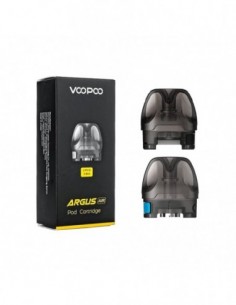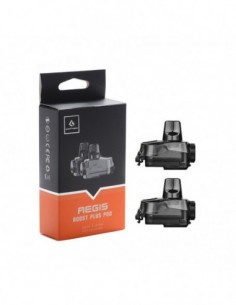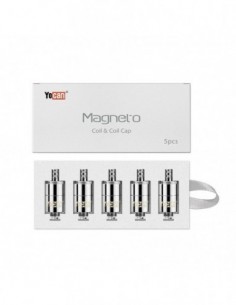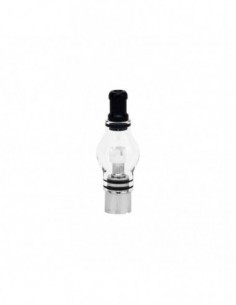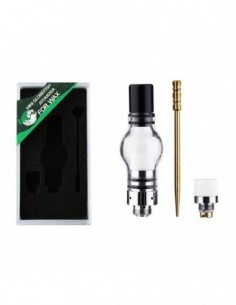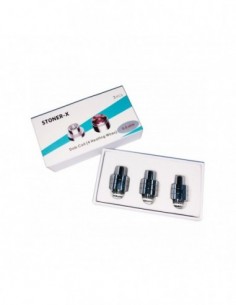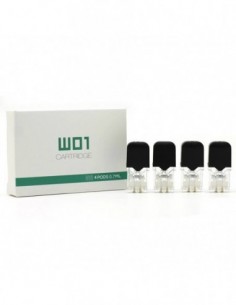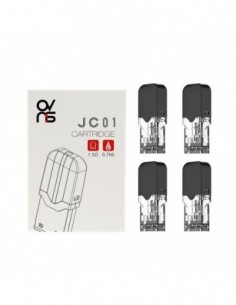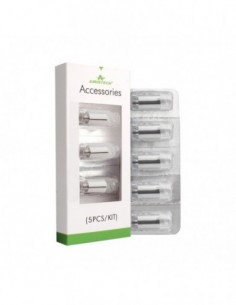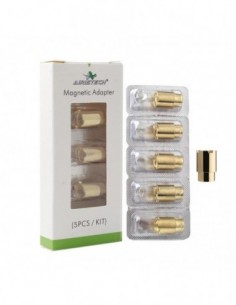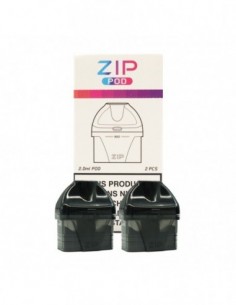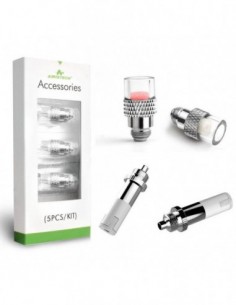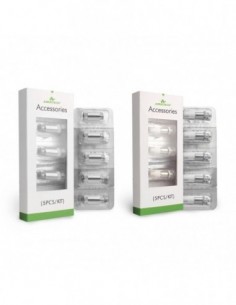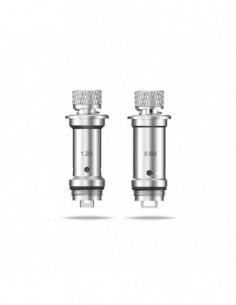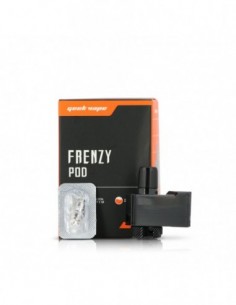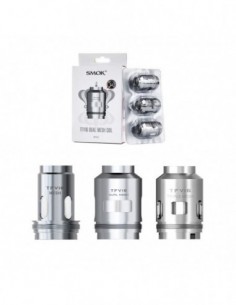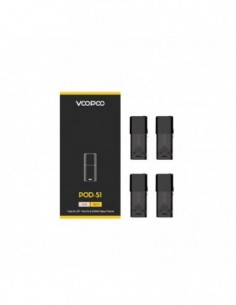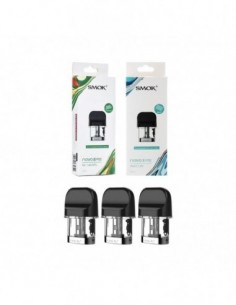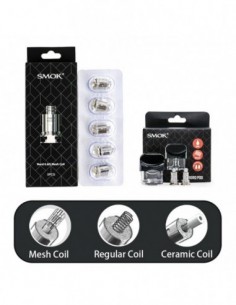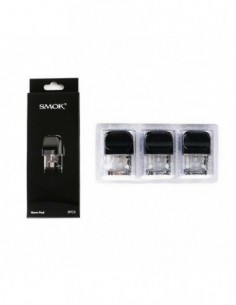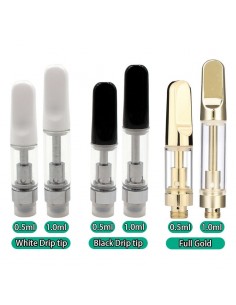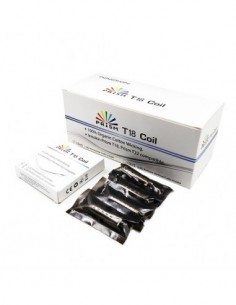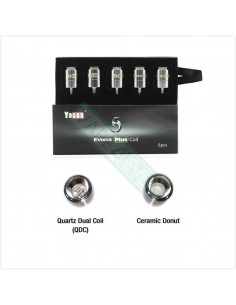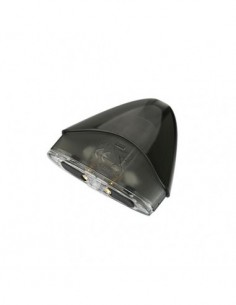Vape Coils and Cartridges
For many people, vaping is more than just a way to quit smoking—it is a hobby or a lifestyle. Tinkering with vape coils and building their own is all a part of the experience. Building coils is mostly limited to vaporizers for e-liquid, and this is because wax pen and dry herb vaporizers typically have their own types of heating elements that aren't ready to be modified. That said, it isn't entirely impossible to do, and there have been instances of it happening for those who are just as passionate about vaping herbs as they are e-liquid. If you're ready to take the next step in your vaping experience to build your own coils, you're in luck. This article will provide you with a beginners guide to coil building and modification, providing you with information about the different types of coils and vape wires, crucial information such as wicking a coil, and even creating your first coil.
What are vape coils?
Vape coils are often reduced to the name "coils" for simplicity's sake, but in actuality, they are atomizer heads. The coil is just one of the components inside of the atomizer head and is responsible for the heating properties. Think of it this way: if your vape mod can be considered the body of the vape, the atomizer heads can be considered the organ that provides the essential function, much like the heart. These vape atomizers are found inside of the juice tank of your vape mod. Inside of the atomizer is a coil consisting of not only a vape wire but also a wick as well. Vape wires and coils are available in a variety of types that we will talk about later, but for now, all you need to know is that this is what is responsible for the production of vapor. Depending on the vape experience you want including the vapor production and beyond, there are different coil materials and resistance levels.
The coils of a vape are measured in what is called ohms. Ohms provide the resistance inside of the atomizer head and determine the way it behaves. Different vape brands have their own compatible coils with different resistances for you to choose from, and finding the right one will help you customize your vaping experience. Coils that have a lower ohm resistance will provide you with fuller clouds, and those with a higher resistance will give you a cooler, more pleasant vape. It's all a matter of preference when it comes to resistance levels, so it's recommended that you try a few.
Types of vape coils
Commonly, the word Clapton will refer to a huge variety of coils that simply have two or more pieces of wire. The very first Clapton coil was one of the first coils to ever need an electric drill to be made, and it has raised the bar for other similar multi-stand coils. Such coils can be fashioned out of different sizes and types of vape wire, though the most common among them are Kanthal, Nichrome and stainless steel. These multi-strand coils are ideal for rebuildable vapes and are diverse, including options like aliens, fused Claptons, staple coils and more.
Clapton coil
When you are looking at a standard Clapton coil, you will see that it is comprised of small-gauge wire that is wrapped snugly around a much thicker core. Because of the design, Claptons tend to take longer to heat up than most round-style coils, but they have a bigger perk: these coils tend to bring about more flavor, thanks to the large surface area and elevated texture. While these coils are preferred for sub-ohm vaping, they are also suitable for mouth-to-lung vaping.
The very first Clapton coil was made by a user of ECF known as mrdee3. The idea came about when he was watching a friend play the guitar and took inspiration from the wrapped, textured strings of the instrument. The first Clapton was created using 32 gauge wire that was wrapped around a larger core made of 24 gauge wire with the help of an electric drill. This is why the Clapton bears a striking resemblance to guitar strings and was named after the famous guitarist, Eric Clapton.
- Clapton coils are available in a spectrum of resistance levels, from over one ohm to sub-ohms
- Clapton coilare ready to be used on most rebuildable decks, thanks to their diverse resistances and diameters
- Clapton coiluse both temperature control wires, such as stainless steel, and power mode wires, such as stainless steel, Kanthal and Nichrome
- Clapton coiloften have slower build-up times than coils with a single strand
- Clapton coilcan be tricky to create yourself, but it is still possible with the right tools
Fused Clapton coil
If you want a faster ramp up time for your Clapton coils as well as increased flavor, Fused Clapton Coils are for you. They use a thin gauge wire around a thicker gauge core and have an increased surface area.
The word "fused" covers the idea of many different wires being wrapped around other wires several times using an outer wire that is on the thinner side. Fused Claptons are technically just pre-built coils that have been stuck together. The first fused Clapton came from a coil builder who goes by Squidoode.
- Fused Claptonsare available in a number of different direct-lung and mouth-to-lung vapes
- Fused Claptonscan be purchased with a variety of resistances and diameters for any build deck
- Fused Claptonsare made from a thin wire that is wrapped around thicker parallel cores consisting of two or more
- Fused Claptonsusually heat up more swiftly than normal Claptons of similar resistance
- Fused Claptonscan be more difficult to create than a standard Clapton
Staggered fused Clapton
When you take a thinner gauge wire and wrap it around a dual Clapton core, you get what is called a staggered fused Clapton. These coils feature Claptonized cores as well as, as its name suggests, a staggered wrap on the outside that increases both its surface area and its texture. With this build comes a slower heat up time, but it definitely adds more flavor over a normal Clapton.
To achieve the staggered effect, the Clapton is crafted using two parallel thin strands. One of them is then removed to give evenly spaced wraps around the exterior. Following this, the Clapton is cut into halves and then fused together with another wire.
Alien / Alien Clapton
Another type of popular Clapton is the alien Clapton, or a Clapton coil that has had its core removed and then wrapped around a standard multi-strand core. It is not unlike a fused Clapton, save for the fact that the outer wrap has a one-of-a-kind texture that makes it stand out from the others. The larger surface area offers great flavor but an increased ramp up time just like with similar Claptons.
Staple coil
A staple coil is characterized by strands made of thinner gauge wires. These wires are then wrapped securely around 8 to 10 flat ribbon wires that are stacked up. This type of fused Clapton coil is known to ramp up more swiftly than the others, thanks to the conduction of the stacked-up coils. There are small grooves in between each of the wraps that help keep the juice inside and give it heftier flavor.
When Squidoode first came up with the idea, the goal was to make an aesthetically pleasing square-shaped coil. That was achieved using the thin round strand that sits on the flat core. Because of its appearance, it was named the staple coil.
Staple coils:
- are often only made with low resistances ideal for direct-lung vapes
- need a clamp style deck or a build deck that is complete with large pot holes due to their thickness
- are made with 8 to 10 ribbon cores that are wrapped with a thin strand
- heat up more swiftly than other similar fused Clapton coils
- more difficult to build than normal Clapton coils
Framed staple coil
A hybrid mix of a fused Clapton and a staple coil, a framed staple coil consists of a round wire framing a stacked ribbon wire, which are fused together using another thin, round wire. With these difference cores come spaces that sit between each wire in order to increase the flavor of the e-juice while actually reducing the ramp up time.
Because of its design, the stacked ribbon core has a framed look that is in between the two rounded cores. This helps to give way to even greater gaps, giving you the benefit of making it easy to wrap.
Framed staple coils…
- are best suited for low resistance, direct-to-lung vaping
- are remarkably thick and need a clamp style deck or a deck with big post holes
- are composed of a ribbon wire that is stuck between two round cores and then wrapped with a thin outer strand
- tend to give vapers a swifter ramp up time than other coils with similar resistances
- can be tricky to make with one person but can be created with the right tools
Tiger coil
Created by builder Leon Shin, tiger coils are comprised of a twisted coil that has one flat ribbon strand and one round strand. By twisting these two uniquely shaped wires together, there are far more gaps and grooves inside of it than a standard twisted coil. This creates more flavor, but it also helps to create denser, warmer, more pleasant vapor.
Tiger coils are also popular for their unique appearance in the way they resemble barbed wire. They are less difficult to make if you are skilled in making twisted coils. While they have decreased in popularity over time, they are still loved by those who like to create more exotic-looking coils.
Tiger coils…
- are low resistance coils that can be used for both mouth-to-lung and direct-lung vaping
tend to be thicker than standard twisted coils but are still able to be used in standard build decks
- are comprised of a flat ribbon strand, a round strand and two twisted wires
- have a swifter ramp up than standard twisted coils due to the ribbon but are still slower to ramp up than standard single strand coils
- are easier to make than most once you master creating standard twisted coils
Hive coil
Comprised of two twisted wires that are then twisted together, the hive coil is a simpler version of a standard Clapton style coil. While it isn't exactly a Clapton, it delivers similar benefits and is a lot simpler to make. There is no need for a drill to create this coil like there is with a Clapton. With all of the ease of creation comes all of the increased surface area of a Clapton, which means an increase in flavor.
This evolution of the original twisted coil is not really common anymore, and while it is considered to be a bit outdated, it is still a simple and effective coil to build if you'd like some extra flavor.
Hive coils…
- are best for direct lung vaping and have a low resistance
- are thicker than most round wire coils and can be built upon almost any deck
- are made out of two twisted wires that are then twisted together to create a total of four strands
- have a slower ramp up time than round wire but a higher one than larger exotic coils
- can be simple to make for those who are comfortable making twisted build
Types of vape wire
There are a few common vape wires that are used in different builds:
- Kanthal
- Nichrome
- Stainless steel
- Titanium
- Nickel
Even though there are different types of wire outside of these, it is widely agreed that they are the most popular. One of the main things to consider when choosing a wire type is whether or not you will be using temperature control modes, power modes or both.
Kanthal wire
Kanthal wire consists of ferritic iron-chromium-aluminum alloy that boasts a nice resistance against any sort of oxidation. It is most commonly used in vapes that work in wattage mode. This material is a good choice for those who are only just getting into dripping and rebuilding, thanks to the simplicity when it comes to building with it, and it is often used when building single wire coils. Even though it is pliable, it is still strong enough to keep its shape after you have made it into coils–his is important when it comes to wicking. It is available just about anywhere, making it even more convenient.
- Pros: Simple to build with with Easy to find, Effortlessly holds shape, Cheap to buy
- Cons: Not for use with Temperature Control vapes
Nichrome wire
Nichrome is another wire type that is great for use with pure wattage mode vaping. The wire is made from a chromium and nickel metal alloy that sometimes has other metal including Iron. It comes in different grades depending on its metal levels, but the most popular is ni80, which is 80 percent nickel and 20 percent chromium.
This type of wire is very similar to Kanthal in its behavior, but it differs in the way it heats up more swiftly and has a lower resistance. It is simple to build with this wire, and it is stiff enough to easily hold its shape while it is being wicked. It is important to note that it has a lower melting temperature than a Kanthal wire, so dry burning requires extra caution. The best way to do so without causing damage is to start at a low wattage and pulse the coils. The other downside of using Nichrome is its nickel composition. Those who have an allergy to nickel won't be able to safely use it. Nichrome used to be less common than Kanthal but now is just as easy to find.
- Pros: Heats more swiftly than Kanthal, Easy to build with, Holds a firm shape
- Cons: Nickel may react with nickel allergies, Lower melting temperature
Stainless steel
Among the most common of vaping wires is stainless steel. It can typically be used for twice as long as other coils and is versatile in the way that it can be used for both temperature control and wattage vaping.
Stainless steel wire is a metal alloy that is mostly made up out of carbon, nickel and chromium. Just like with the Nichrome, there are different grades that are labeled numerically. When it comes to coil building stainless steel wire, you will most commonly see SS316L wire being used, followed shortly after by SS317L wire. This wire has a nickel content of around 10 percent, and while it is less than the content of a Nichrome coil, it is still recommended that those with nickel allergies avoid it.
Stainless steel is simple to wrap into coils and reliably holds its shape. It warms up more swiftly than Kanthal because of its naturally low resistance. Like with Nichrome, you will want to use caution when dry burning stainless steel wires, especially at higher wattages; doing this might release some chemical compounds that you don't want to breathe in. The best way to avoid this is to make coils that won't need to be dry burned to check for hot spots. Just like Nichrome and Kanthal wires, these stainless steel wires can easily be found in most shops and online.
- Pros: Compatible with both temperature control and wattage vapes, Heats up faster than Kanthal, Simple to build with, Holds its shape
- Cons: Traceable nickel content, Unsafe for dry burns at high wattages
Kanthal vs. Nichrome vs. stainless steel (wattage)
When it comes to vaping, many people prefer to use power mode for its simplicity. When it comes to power mode, the most commonly used wires are Nichrome, Kanthal and stainless steel. There are different benefits to the different wires that you can consider before choosing the one for your power mode vape; again, if you have a nickel allergy, avoiding Nichrome and stainless steel coils might be in your best interest.
Because of its high resistance and ease of use, Kanthal is the most common choice. Those who vape mouth-to-lung tend to prefer the 26-26 gauge Kanthal wires because of their higher builds, and they are always dependable. Even in the case of its slow warm-up times, mouth-to-lung vapers who like to take long, slow draws can benefit.
Conversely, stainless steel and Nichrome are great for those who like to vape at lower resistances on power mode. For those who like sub ohm vaping, these types of wires let them go super low in ohms while still giving them a swift ramp up time. Those who use stainless steel or Nichrome wires also tend to report that the flavor is much better than Kanthal coils.
Nickel wire
Nickel wire, which will also commonly be referred to as ni200, is often made purely out of nickel. This wire was the first-ever wire to be used in temperature control vape mods and is also the first wire that we will talk about that is cannot be used with wattage vapes. With this type of wire comes two significant downfalls, the first of which being that nickel can be tricky to build into symmetrical, uniform coils. It can also become deformed during the wicking process.
Secondly, because the wire is pure nickel, some people may have allergic reactions to it if they have any sensitivity or allergy to the metal. It might also just be uncomfortable for some users. There are other wires that have some nickel, but none are as concentrated as these wires.
Nickel wire is very popular with those who use temperature control mods and can be found in most stores because of it.
- Pros: It can be used with temperature control mods
- Cons: Cannot be used with wattage modes, Can be difficult to form, Nickel content may cause reactions, Doesn't hold shape well
Titanium wire
The final wire to be considered is titanium wire. This wire is made from titanium and is another wire that can only be used with temperature control mods.
The safety of this wire has been heavily debated, because when is heated to about 648 degrees Celsius, it can release a toxic element called titanium dioxide. Just like with magnesium, if it catches on fire, it is very hard to put out. Because of this, some shops may not even sell the wire.
Even with the risks, there are still safe ways to use it, especially if your temperature control mod is working as it's supposed to. You shouldn't have to worry about titanium dioxide being released or combustion. This means you should never dry burn your titanium wire.
For its drawbacks, it is remarkably simple to wick and coil, but it could be difficult to find because of its safety issues.
- Pros: Compatible with temperature control units, Simple to form, Easily holds shape
- Cons: Risk of titanium dioxide poisoning, Risk of combustion, May be difficult to buy in shops
Stainless Steel vs. Nickel vs. Titanium
When it comes to these two, stainless steel wires are generally preferred because of its ease of use, availability everywhere, ability to work in both temperature control mods and wattage vapes. Its nickel content is low and is less likely to cause reactions in those with nickel allergies.
Those who prefer temperature control but have a nickel allergy should consider using titanium instead, but always keep its risks in mind.
Vape Coil Resistance
Another component of wires to think about is their resistance. It is determined by a few things:
- The gauge or size of the wire
- The diameter of the coil build
- How many wraps will be used to make the coil
- The larger the gauge and the thinner the wire, the higher resistance there will be
The different resistances of the wire will also depend on its material. For instance, if there is 24 gauge Kanthal wrapped five times creating an inner diameter of 2.5 millimeters, the resistance will be around .45 or .5 ohms. Using a stainless steel wire to the same specifications, there would be 10 wraps instead of five to bring on the same resistance level.
When thinking about low and high resistances, remember that the higher the resistance, the less power it will take to heat up the coil. Conversely, the lower the resistance, the higher the power it will take to heat up the coil. If you want to save your battery and e-juice, think about using higher resistance coils.
How To Choose The Perfect Vape Coils?
Because vape coils of different types aren't compatible with every single device, you will need to find the right one depending on your mod.
- Buy from the same vape brand. A lot of manufacturers will create coils that are suitable for use with their own devices. This will ensure that your coils will be compatible. Buy replacement coils from the options presented by the same brand as the vape you use.
- Think about the resistance. Many types of vape coils will offer a variety of resistances for you to choose from. Those who manufacture coils will usually tell you which resistance goes with which wattage to make it easier for you. Before you buy a new coil, buy the one that fits the wattage you normally vape at.
- Look at recommendations. Through vape4ever.com, you can get plenty of information regarding the different vape types as well as an explicit statement about which coils go with which vapes. This takes the guess work out of your purchase to give you peace of mind.
How often do I need to replace my vape coils?
You will need to change your coil when it is too worn out to keep performing its job. How often you need to change the coil depends on different things such as what temperature you vape at, how often you vape, the kind of juice you prefer and other similar factors. Some vapers are able to go weeks at a time without changing the coils, while others need to replace them weekly. Keeping replacement vapes on hand is important, so that you aren't ever left high and dry when it comes time to change them.
Troubleshooting your vape coils
When it comes to premade coils, the ease of installation is a perk, but the occasional issues that come along with them may be troublesome. Some of the most common issues you will run into include the following:
- The device won't fire after you replace the coil. In this instance, it usually means that you haven't installed the coil properly. It may also not be screwed into the mod all of the way. Dump out the juice in your tank and take the coil out. Then, take care when you screw it back in to ensure it's on there evenly.
- Atomizer leaks post-coil change. When this occurs, it is another case of not installing it properly. Just unscrew it and screw it back in more evenly.
- The vape juice tastes burnt after a change of coil. This usually means that you have accidentally burned the coil by taking a dry hit. It will probably still work, but the taste might be off until you change it again.
Conclusion
At the end of the day, each one of these coils will ultimately perform the same function: produce vapor. Whether you're a hobbyist or a casual vaper, you can enjoy the benefits of all of the different coil styles—even Claptons, as they now make premade Claptons that you can install as easily as any other coil. This includes not just standard Claptons but aliens, fused Claptons, staggered staples and more.
You can also purchase Claptons in a variety pack that will let you try out the different styles to find the one you prefer the most. These pre-wrapped Claptons are more than worth the money as they save you time and effort on building. These types of coils are low resistance, so it's important that you understand Ohm's law and battery safety before using them. This is especially true on a mechanical mod. Just like anything else surrounding vaping, there are many different options and components to consider, so just make sure you're picking the right one for your device and your personal tastes. There is no wrong answer.

